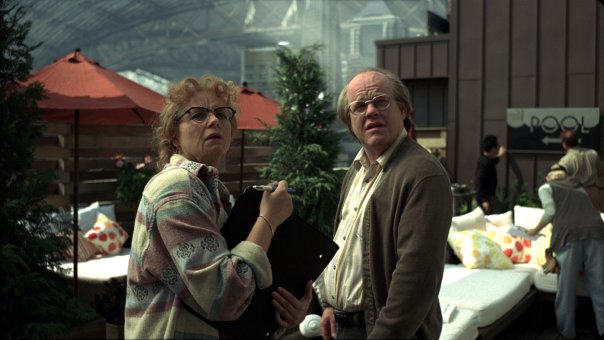Ambitious; I don’t believe there’s a better way to describe both the characters and aim of Charlie Kaufman’s “Synecdoche, New York.” With its odd pacing and macabre subject matter, I can fully understand the aspects of it that don’t appeal as well. Though in my (infinitesimally insignificant) opinion, I regard it as one of the greatest films I have ever seen. Though it may not be a perfect film, it’s brimming with emotion and life with its deceivingly optimistic themes. The late Philip Seymour Hoffman in his performance as the ever-ailing Caden Cotard becomes all the more chilling as we follow the life of a man obsessed with himself.
Set in Schenectady, New York, our story is that of theatrical director Caden Cotard, his wife and his daughters, Adele and Olive. Though successful, Caden continually finds himself dissatisfied with his work and marriage. As he struggles, he that finds aspects of his life, be it his health or relationships, begin to deteriorate around him. The passage of time becomes a blur as Caden decides to embark on his magnum opus, a play, to depict his life in excessive detail. As Caden remarks in one of his many soliloquies, this play seeks “to delve into the murky, cowardly depths of my…being…[to] correspond to the notes I truly receive every day, from my God.” The world and the play become one as Caden buries himself in his sets of New York, casting thousands in the play of the century.
Those of you who have seen “Eternal Sunshine of the Spotless Mind” will immediately notice the parallels it has both technically and in dialogue (a Kaufman script)—a discussion for another article but worth noting. As the world devolves into Caden’s abstract interpretations, we see increasing ambivalence amongst all the characters, with both the real ones and the ones within the world Caden has enclosed himself. By subverting absurd as normal, the true meaning of his works are revealed. Much like in Caden’s world, most of the shots are simply facing Caden, anything around him is either blocked or obscured. Whenever we are seeing characters speak at Caden, the importance in relation to the story is monumental. As much of the story revolves around their deterioration, they are made to stand out in relation to the rest.
“Synecdoche, New York” has a lot to say—it covers an extremely vast subject, about as vast as Caden’s creation. We see a life represented by extremes, relationships that end seemingly before they progress, Caden’s rampant narcissism and the passage of years in minutes. Caden is an amalgamation of some of our most shameful traits. Despite nearly every companion berating his lack of empathy and his shortsighted ambitions, he continues his path, no matter how much it hurts others. The various ailments Caden suffers begin to represent the tainted nature of his soul. His hearing fails him as he neglects listening to his wife, and his legs begin to falter as he sits idly. Caden’s impossibly large stage represents the hindsight we all employ daily, the regret we feel about what could have been.
His obsession with the play, to the point that it sabotages his own life, is much like how our tendency to dwell on the past hinders our own development — the lust for closure that prevents us from opening new doors, getting up in the morning or meeting new people. This deep depression is manifested by his refusal to leave the set and venture back into the real world, a place where he cannot control the actions of the players. This connects to the narcissism, that Caden holds deep down because of his failures. He fails to see past others feelings that don’t regard him, leading to numerous misunderstandings that precipitate the film’s solemn ending.
“Synecdoche, New York” is a film for the ages. Its peculiar nature and touching message left me dumbfounded for many hours after I first saw it, and I think, unfortunately, we can all see some of ourselves in poor Mr. Cotard.
Jackson Walker can be reached at [email protected].




















Steven • Nov 10, 2018 at 1:36 am
Great review. And I’m sold on seeing “Synecdoche, New York.”
I too have admired Kaufman’s genius. He is an extremely brave screenwriter whose ideas never fail to impress. “Malkovich” was great, as was “Sunshine,” as you mentioned. Probably his best was “Adaptation,” which I’m sure you’ve seen.
Quite frankly, after “Adaptation,” I wasn’t sure if any other Kaufman film could compare. I had avoided “Synecdoche” partly on that basis. However, I’m glad to have been reminded of it via your piece; I will check it out soon. Thanks…